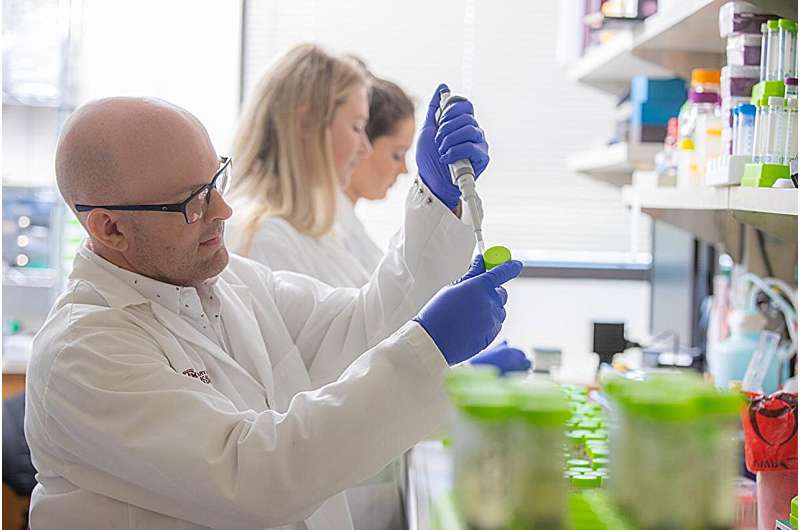This article has been reviewed according to Science X's editorial process and policies. Editors have highlighted the following attributes while ensuring the content's credibility:
fact-checked
trusted source
proofread
Children can inherit early aging symptoms from parents who abuse alcohol, researchers find

Researchers at the Texas A&M School of Veterinary Medicine and Biomedical Sciences (VMBS) have discovered that parents who struggle with alcohol use disorders can pass along symptoms of early aging to their children, affecting them well into adulthood. Their results are published in Aging and Disease.
These accelerated aging effects—including high cholesterol, heart problems, arthritis, and early onset dementia—can be passed down from either mom or dad individually, but they become worse when both parents have an issue with alcohol abuse, especially in male offspring.
"Scientists have wondered what causes children who grow up in homes where there is alcohol abuse to be more susceptible to becoming sick," said Dr. Michael Golding, a professor in VMBS' Department of Veterinary Physiology and Pharmacology. "For example, we know that these children have behavioral problems that make it difficult to cope with stress and might lead to conflict with school systems or law enforcement."
But what scientists didn't know was the cause behind the early aging and disease susceptibility—was it stress or something inherited from these children's parents?
"Now we know that they're inheriting dysfunction in their mitochondria as a result of their parents' substance abuse," Golding said. "The dysfunction causes these individuals to show early signs of age-related disease when they're still considered young, usually in their 40s."
With this new understanding, Golding hopes that doctors can work with patients to improve their mitochondrial health—and possibly delay the inherited dysfunction as they age—using methods like exercise and increasing intake of certain vitamins.
Alcohol and aging
As adults get older, they develop a biological condition called senescence, which is when cells slow down and stop dividing, limiting the body's ability to replace deteriorating cells.
"Senescence is a key marker of aging, especially in the brain, where it leads to cognitive dysfunction and memory problems," Golding said. "Scientists have known for a long time that heavy alcohol use can cause early onset of senescence in adults."
Using a mouse model, research by Golding and his team revealed that senescence also happens to be one of the early-aging symptoms that offspring can inherit from parents who daily drink alcohol to the legal limit or more.
"We also see fat increase in the liver, which creates scar tissue," Golding said. "It's especially common in male offspring. In fact, if both parents have an issue with alcohol abuse, it can have a compounded effect on male offspring, making them even more likely to get liver disease."
Parental drinking and child health
Golding's lab focuses on the biological relationship between parental alcohol use and child development. His lab recently uncovered that fathers—not just mothers—can contribute to children developing Fetal Alcohol Syndrome, or FAS. As a result, he also continues to advocate for parents reducing their alcohol consumption prior to conception.
"There are all sorts of problems that children can develop right after they're born because of FAS," Golding said. "But what we haven't understood well until now is how parental drinking habits might go on to affect these children into adulthood and influence their 'healthspan'—the number of years someone is healthy without chronic and debilitating disease.
"Both the birth defects that come with FAS—like abnormal facial features, low birth weight and/or height, and attention and hyperactivity issues—and the stress from living with them create unique challenges. So do any environmental issues that these children may grow up with, including adoption and the foster system," he said.
"But now, we understand that there's yet another component—early aging—that is inherited directly from one or both parents."
Understanding multi-generational health
This latest discovery also suggests that parents can pass along the benefits of healthy living to their children. According to Golding, healthy lifestyle choices also compound generationally, making efforts to reverse aging—through things like diet and exercise—beneficial for generations to come.
"Parental health pre-conception—both parents' overall health before pregnancy—is critical for the health of offspring," he explained. "The more you can do as a prospective parent to get into a healthy mindset and a healthy lifestyle, the more significant effects you'll have on the health of your kid both right at birth and even into their 20s and 40s."
More information: Alison Basel et al, Parental Alcohol Exposures Associate with Lasting Mitochondrial Dysfunction and Accelerated Aging in a Mouse Model, Aging and Disease (2024). DOI: 10.14336/AD.2024.0722





















